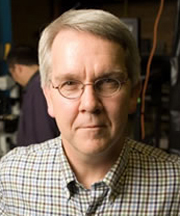
Paul W. Bohn, Presidential Faculty Fellow and the Arthur J. Schmitt Professor of Chemical and Biomolecular Engineering at the University of Notre Dame, is one of the co-authors of a paper establishing an aggressive research agenda to address problems central to providing clean water in adequate quantities across the worlds diverse populations.
In the paper, which appears in todays edition of Nature, Bohn and colleagues from the University of Illinois, MIT and Yale examine the problems inherent in current water purification strategies and identify the key scientific and engineering hurdles to purifying water while minimizing adverse environmental impacts.
The paper highlights such problems as deactivating waterborne viruses, developing new nanoscale sensors and linked remediation strategies to identify and remove low-level chemical contaminants, discovering novel techniques to allow the safe reuse of wastewater, and improving devices for the desalinization of heavily salted waters.
An overriding theme of the piece is the geographic heterogeneity in water issues. Not only do different areas of the world face differing water purification problems, even moving a distance as little as 10 miles can present new purification challenges. Bohn noted that conventional methods of water purification are often chemically complex and intensive, requiring a high degree of engineering expertise, well-developed infrastructure and significant capital, which makes them impractical for the developing world.
A design for disinfecting membranes, suited to the United States and Western Europe, wont necessarily be appropriate for use in Bangladesh,he said.We need, instead, to develop a broad spectrum of different processes well suited to the local technology base.
A member of the Notre Dame faculty since 2006, Bohns research interests encompass molecular transport on the nanoscale scale, chemical sensors and molecular approaches to nanotechnology.
Bohn believes that the paper both issues a call to help shape the future of clean water and echoes Notre Dames commitment to addressing core infrastructure problems in the developing world. Steve Silliman, a Notre Dame professor of civil engineering and geological sciences, has led student learning teams to Haiti, where they teach local villagers how to repair hand pump wells, which are the primary source of clean drinking water in the country.He also has led student teams to West Africa to conduct ground water research and to develop a major monitoring program for ground water research.
Water purification represents a great opportunity to make a real difference in the developing world by delivering new, safe and affordable methods to increase clean water supplies for the whole world,Bohn said.
_ Contact: Paul W. Bohn, Arthur J. Schmitt Professor of Chemical and Biomolecular Engineering, 574-631-1849,_ " pbohn@nd.edu ":mailto:pbohn@nd.edu _.
_
TopicID: 27027